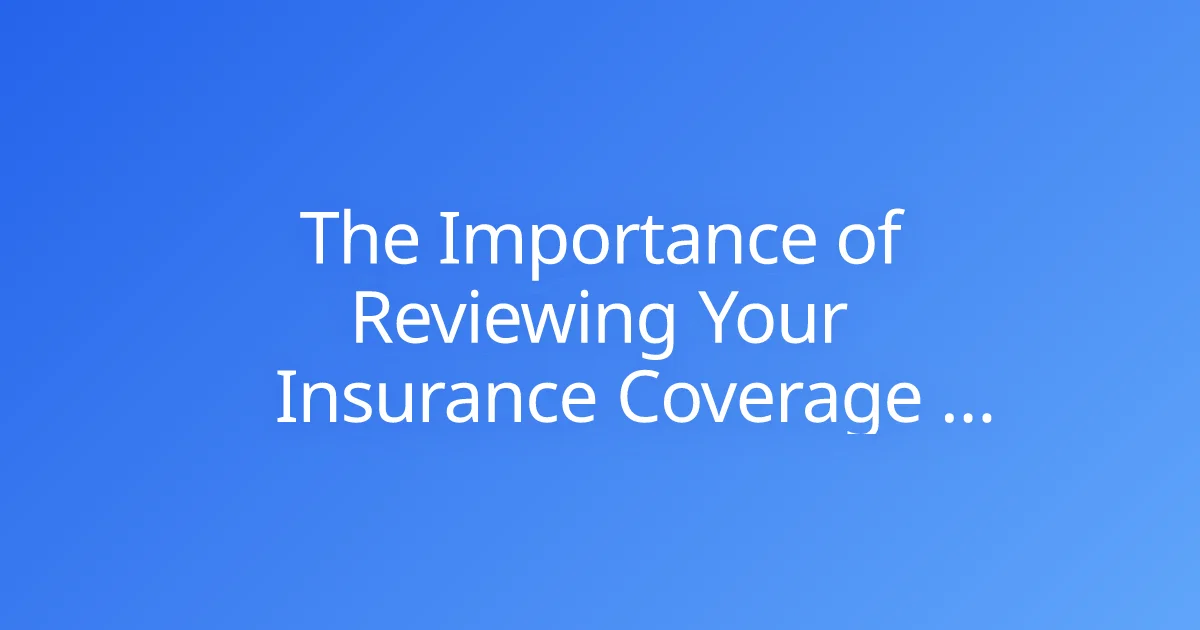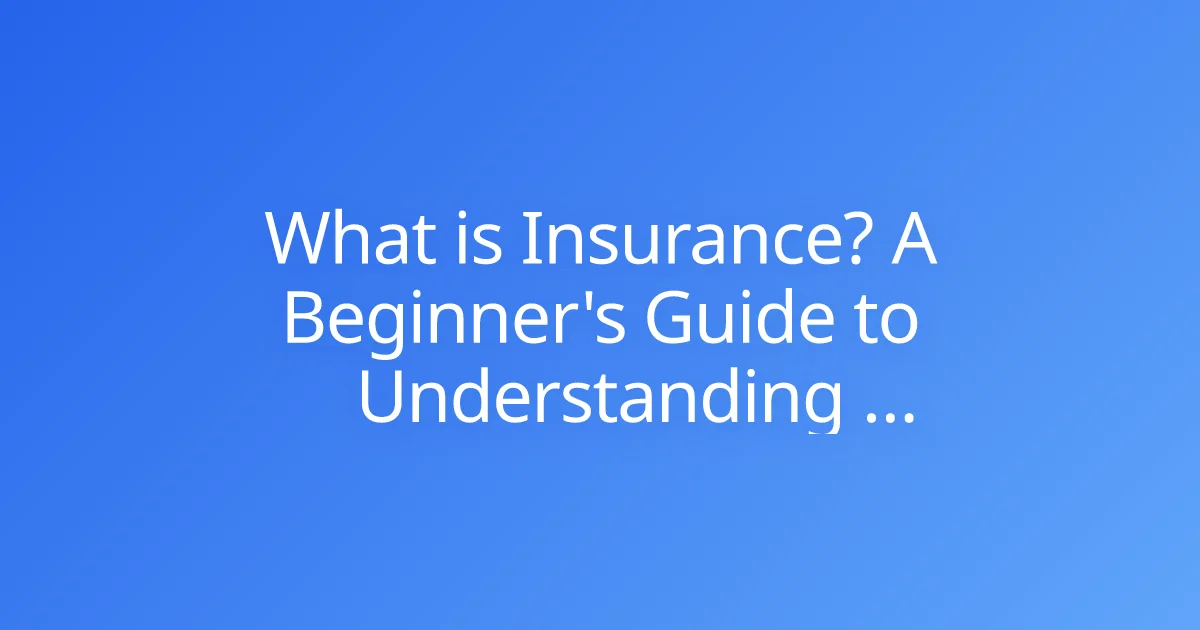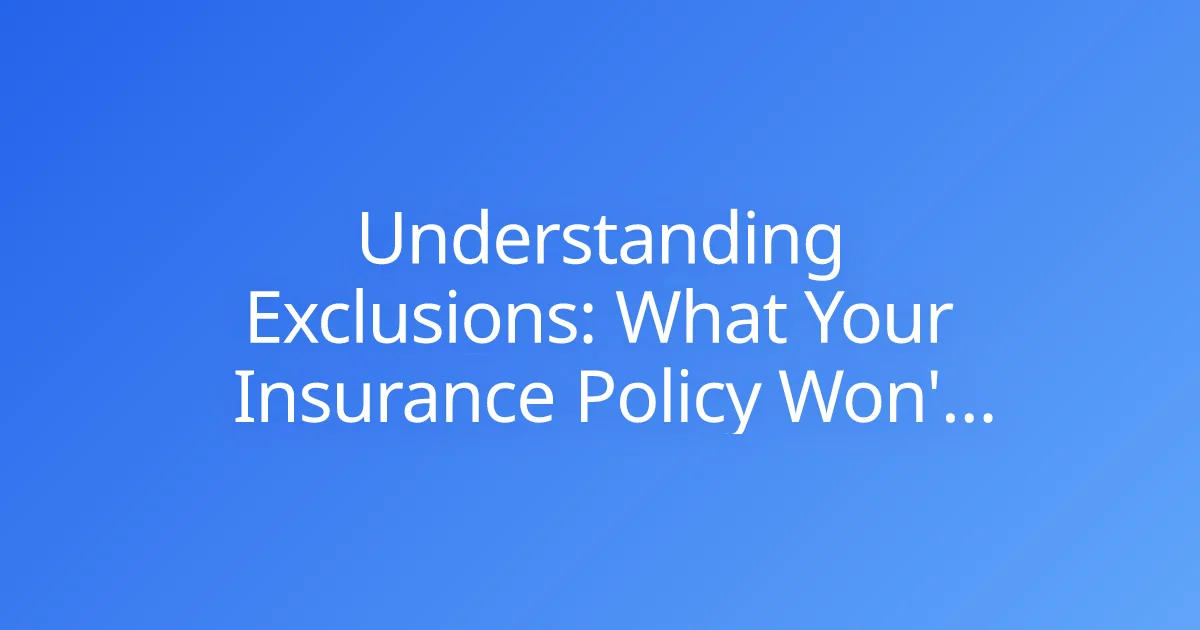The Importance of Reviewing Your Insurance Coverage Annually
When was the last time you truly looked at your insurance policies? For many, once a policy is purchased, it's often tucked away and forgotten until a renewal notice arrives or, worse, until a claim needs to be filed. This "set it and forget it" approach to insurance is a common, yet potentially costly, mistake. Life changes constantly, and your insurance needs evolve right along with it. Failing to periodically assess your protection can leave you either dangerously underinsured or needlessly overpaying.
At The Policy Explainer, we emphasize that proactive insurance management is key to financial security. This comprehensive guide will highlight the importance of reviewing your insurance coverage annually. We'll explain why this vital check-up isn't just a good idea, but a necessity, helping you identify potential coverage gaps, unlock savings, and ensure your policies genuinely reflect your current life and assets. By making an annual insurance review a priority, you empower yourself to adapt your protection to your evolving world.
Why an Annual Insurance Review is Non-Negotiable
Your insurance policy is a living document, not a static one. The world around you, and your place within it, is constantly changing. An annual review ensures your protection keeps pace.
Life Changes Demand Policy Adjustments
Life is a series of milestones and transitions. Getting married, having a child, buying a new home or car, changing jobs, starting a business, or even just aging — each of these events has a direct impact on your insurance needs. What was adequate coverage five years ago might be woefully insufficient today, or you might be paying for coverage you no longer require. An annual review is your opportunity to align your policies with your current reality.
Uncovering Hidden Savings
Insurance rates and available discounts are constantly fluctuating. Insurers update their pricing models, introduce new discounts, and new competitors enter the market. Without an annual check-in, you could be missing out on significant savings simply because you're unaware of better rates or new discounts for which you now qualify. This could be due to a better driving record, safety improvements to your home, or bundling opportunities.
Identifying and Closing Coverage Gaps
Perhaps the most critical reason to review your insurance coverage annually is to identify and address coverage gaps. These are areas where you might be uninsured or underinsured, exposing you to significant financial risk. A standard policy might not cover your new valuable art collection, the home-based business you just started, or the specific risks associated with a major renovation. An annual review allows you to spot these vulnerabilities before an incident occurs.
Ensuring Accuracy and Preventing Claim Issues
Policies often rely on accurate personal and property information. If your address, vehicle details, or health status (for certain policy types) are outdated, it could lead to issues during a claim or even policy cancellation. An annual review helps ensure all information is correct, preventing potential headaches during a stressful time.
Key Life Changes That Demand a Policy Review
While an annual review is generally recommended, certain life events are definite triggers to pick up the phone and discuss your insurance.
Homeownership & Property Changes
- Buying a New Home: Your coverage needs will change dramatically. You'll need homeowners insurance, and possibly flood or earthquake insurance depending on the location.
- Renovations or Additions: Major home improvements increase your home's value and replacement cost, meaning your dwelling coverage needs to be updated.
- Property Upgrades: Installing a new roof, security system, or smart home technology might qualify you for discounts or require adjustments to coverage.
- Renting Out Property: If you start renting out a portion of your home, your standard homeowners policy won't cover tenant-related risks. You'll need landlord insurance or a specific endorsement.
Family Status & Dependent Changes
- Marriage or Divorce: Your marital status can affect auto and life insurance rates. Divorce requires a complete re-evaluation of all policies, especially life and health.
- Birth or Adoption of a Child: This is a major trigger for increasing life insurance, reviewing health insurance, and possibly updating auto insurance if a new driver will be added later.
- Child Getting a Driver's License: A significant event that will impact your auto insurance premium and coverage needs.
- Child Leaving for College: They might still be covered under your health or auto policies, but it's worth checking for discounts or specific coverages for dorm living.
Vehicle & Transportation Changes
- Buying a New Car: The make, model, year, and safety features of your new vehicle will all impact your auto insurance premium and coverage needs.
- Selling a Car: You can remove it from your policy to save money.
- Changing Commute: If you start driving significantly more or less, your premium might change.
- New Driver in Household: Anyone new living with you who drives your car needs to be on your policy.
Career & Financial Changes
- Changing Jobs: A new occupation might qualify you for different group health plans or professional discounts.
- Starting a Home Business: Your personal homeowners policy generally won't cover business-related property or liability. You'll likely need a specific home business endorsement or a separate business policy.
- Significant Income Change: This could impact how much liability coverage you need (to protect future earnings) or how much life insurance you require.
- Acquiring Valuables: New jewelry, art, or collectibles may exceed standard policy limits and require a special rider or endorsement.
What to Review in Your Insurance Policy Annually
When conducting your annual insurance check-up, focus on these critical areas:
1. Coverage Limits and Types
- Are your liability limits sufficient? Ensure they match your assets and potential earnings.
- Is your property adequately covered? For home, is your dwelling coverage enough to rebuild at current construction costs? For auto, is your comprehensive/collision coverage appropriate for the car's current value?
- Are all necessary coverages included? Have you added new risks (e.g., a boat, an ATV) that need separate coverage?
2. Deductibles
- Can you still afford your deductible? If your emergency fund has grown, consider increasing your deductible to lower your premium. If it's shrunk, a lower deductible might be safer.
- Do your deductibles align across policies? Consistency can simplify financial planning.
3. Discounts You May Qualify For
- Ask about new discounts: Did you install a new security system? Take a defensive driving course? Join a new professional organization? Many insurers offer discounts for these.
- Bundling opportunities: Can you save money by consolidating policies with one insurer?
4. Exclusions and Endorsements (Riders)
- Review all exclusions: Remind yourself of what your policy doesn't cover.
- Check existing endorsements: Do you still need that rental car reimbursement? Is the scheduled jewelry still accurate?
- Consider new endorsements: Are there new risks (e.g., home business) that require specific add-ons?
5. Personal Information Accuracy
- Contact details: Is your address, phone, and email correct?
- Named insureds/drivers: Are all household members who should be covered listed, and are there any who should be removed?
- Vehicle/Property Details: Are descriptions, mileage, and features accurate?
The Benefits of Regular Policy Reviews
Making an annual insurance review a habit yields numerous tangible benefits:
- Financial Peace of Mind: Knowing your coverage is current and adequate allows you to face uncertainties with confidence.
- Optimized Costs: You're more likely to pay only for the coverage you need and take advantage of all eligible discounts, leading to direct savings.
- Reduced Risk of Denied Claims: Accurate policy information and appropriate coverage significantly lower the chances of a claim being denied due to outdated data or uncovered perils.
- Simplified Claims Process: When you know your policy inside and out, the claims process becomes less stressful and more efficient.
- Strategic Planning: Insurance is a cornerstone of financial planning. Regular reviews ensure your protection aligns with your broader financial goals.
How to Conduct Your Annual Insurance Check-up
Ready to take control? Here’s a simple process for your annual insurance review:
- Set a Reminder: Pick a specific time each year (e.g., your birthday, a policy renewal date, or the start of a new year) to dedicate to your insurance review.
- Gather All Policies: Collect the declarations pages for all your insurance policies (auto, home, life, health, umbrella, etc.).
- Note Major Life Changes: List any significant changes from the past year related to your assets, family, career, or health.
- Review Each Policy Systematically: Go through the key points mentioned above for each policy:
- Confirm personal details are accurate.
- Verify coverage limits and deductibles.
- Check for any new exclusions or conditions.
- Review existing endorsements and consider new ones.
- Contact Your Agent or Insurer: Schedule a call with your insurance agent or the company's customer service. Discuss the changes you've noted and ask about:
- Any new discounts for which you qualify.
- Adjusting coverage limits or deductibles.
- Adding or removing endorsements.
- Clarifying any confusing terms or conditions.
- Get New Quotes (Optional but Recommended): Every 1-2 years, consider getting quotes from at least 2-3 other insurers to ensure your current premiums remain competitive for the same level of coverage.
Conclusion
The importance of reviewing your insurance coverage annually cannot be overstated. It’s a proactive and intelligent financial habit that ensures your protection evolves with your life. By dedicating a small amount of time each year, you can identify critical coverage gaps, uncover potential savings, and maintain peace of mind, knowing that your insurance policies are truly working for you. Don't let your valuable protection become outdated; make that annual check-up a non-negotiable part of your financial routine. Do you have any specific life changes coming up that you're wondering how to account for in your insurance, or need tips on finding a reliable agent for your review?



